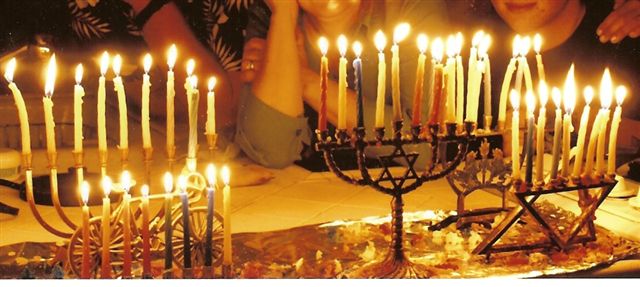Rav Rahmiel Hayyim Drizin
offers teachings, a sefer, on CHANUKAH
Gift for us all:
http://www.berahamimlehayyim.com/wp-content/uploads/2015/11/HanukahGifts2.pdf
http://ish-tam.com/blog/2013/11/22/chanukkah-5774/
My favorite Chanukah excerpts are on HOD.
The Sages themselves demarcate Hanukah for Hod-ing, thanksgiving.
page 7.
According to most mystical commentaries, Hanukah correlates with Hod/thanksgiving.11
Hanukah relates to the middah (concept/attribute) of Hod, which besides Thanksgiving also connotes light or brightness – it represents a unique inner shining quality that an entity has. [Rav Hirsch to Daniel 10:8] Usually people look at something — whether it is people or pieces of knowledge — and they glance at its basic outer layer. However, there are usually deeper layers of significance that the sweep on an eye doesn’t catch. People are very complex and unique; factual information can have deeper implications and meaning. This concept of Hod/deeper essence was a big part of the battle between the Jews and their enemies in the story of Hanukah.
--
footnote 12: Hod = 15, the sum of all numbers from 1 to 5. Hod expresses and reflects all the five emotions of the heart from Chesed to Hod. The Holy Zohar describes "Binah [the "mother" of the emotions of the heart] extends until Hod."
What is this “Hod”?
Hod, as described by Rabbi Yitzchok Ginsburgh, is associated in the soul with the power to continually advance, with the determination and perseverance born of deep inner commitment, toward the realization of one's life goals. The acknowledgment of a supreme purpose in life, and the total submission of self which it inspires, serve to endow the source of one's inspiration with an aura of splendor and majesty. Hence the word Hod connotes both "acknowledgment" (hoda'ah) and "splendor," in the sense of an aura-like "reverberation" (hed) of light.
The hoda'ah aspect of Hod also manifests itself as the power to express gratitude (thus qualifying it as a sefirotic response to chesed), as well as the power of "confession" (vidui).
Spiritual vision is associated with the sefirah of Hod. This is particularly important in that the appellation "Jew" (Yehudi), comes from the name of the tribe of Judah (Yehudah), whose word-root is Hod. Hod represents a number of attributes in the soul--"praise" and "thanksgiving" (hodaya), "acknowledgment" (hoda'ah), "confession" (vidui) and "glory" (Hod)--all having the word Hod as their root. The common characteristic to them all is the consciousness of surrendering to a higher Divine power in the world and the soul. This property is similar to that of selflessness and making oneself "small": "for you were the fewest of peoples."
Hod, as described by Rabbi Yitzchok Ginsburgh, is associated in the soul with the power to continually advance, with the determination and perseverance born of deep inner commitment, toward the realization of one's life goals. The acknowledgment of a supreme purpose in life, and the total submission of self which it inspires, serve to endow the source of one's inspiration with an aura of splendor and majesty. Hence the word Hod connotes both "acknowledgment" (hoda'ah) and "splendor," in the sense of an aura-like "reverberation" (hed) of light.
The hoda'ah aspect of Hod also manifests itself as the power to express gratitude (thus qualifying it as a sefirotic response to chesed), as well as the power of "confession" (vidui).
Spiritual vision is associated with the sefirah of Hod. This is particularly important in that the appellation "Jew" (Yehudi), comes from the name of the tribe of Judah (Yehudah), whose word-root is Hod. Hod represents a number of attributes in the soul--"praise" and "thanksgiving" (hodaya), "acknowledgment" (hoda'ah), "confession" (vidui) and "glory" (Hod)--all having the word Hod as their root. The common characteristic to them all is the consciousness of surrendering to a higher Divine power in the world and the soul. This property is similar to that of selflessness and making oneself "small": "for you were the fewest of peoples."
The word “vidui” or confession stems from the same root as hoda’ah, which can mean either confession or thanks. This is not mere coincidence; both words are in essence the same. Hoda’ah is at the core an act of acquiescing to another person, bending the “I” to “you.” Thus, when a person owes someone money, he may admit to this fact (hoda’at ba’al din), declaring that the money that is purportedly his is actually the other person’s. When someone gives me a gift or renders me a service, I thank him (modeh, todah). The thanks are an acknowledgement that “my” object is actually “yours”, and I did not acquire it because of my productivity and industry. Likewise, when I confess (modeh, vidui, hoda’ah), I am making a statement of acknowledgement, acquiescence, and submission to G-d. I have wronged You: “Lecha Hashem hatzedakah velanu boshet hapanim – To You, O G-d, belongs charity, while we are shamefaced.”
Hanukah celebrates the Tikkun of Hod – ו . On the basis of this, the Rebbe of Slonim asks an unusual question. Hod – ו is the eighth of the Sefirot, counting down from the first Keter. This represents the very lowest, distressed level of spirit that existed during the Greek occupation of Eretz Yisra’el.
~
MORE
http://templemenorah.blogspot.com
MORE
http://templemenorah.blogspot.com
Joy Krauthammer in a state of HOD/gratitude, always,
not only on Chanukah and Thanksgiving,
and loves to play for others
her crystal and Tibetan singing bowls.
~ ~ ~


+Joy.jpg)
No comments:
Post a Comment